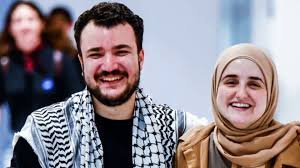Defiant return of pro-Palestinian student leader Mahmoud
After spending over 100 days in detention despite being a lawful US resident, Mahmoud Khalil has walked free; his case has drawn comparisons to some of America's darkest chapters
THE WORLDVIEW
June 26, 2025
PRO-PALESTINIAN student leader Mahmoud Khalil, a Columbia University graduate and US lawful permanent resident, has been released after spending 104 days in Immigration and Customs Enforcement (ICE) custody in Louisiana. Arrested on 8th March, 2025 outside his New York residence amid a campus crackdown, he was detained under the rare invocation of the Alien Enemies Act and related immigration statutes.
Khalil’s detention drew swift backlash from civil‑liberties advocates. A federal judge, Michael Farbiarz of New Jersey, described the continued incarceration of a non‑violent legal resident as “highly, highly unusual,” emphasising that Khalil posed neither a flight risk nor danger to the public. On 20th June, Farbiarz ordered Khalil’s release on bail while legal proceedings continue, including DHS’s appeal and an unresolved claim of alleged misrepresentation on his Green Card application.
A permanent resident, married to US citizen Dr Noor Abdalla, Khalil was not charged with any crime related to violence. Instead, authorities sought to deport him under narrowly‑used provisions tied to national‑security and foreign‑policy justifications — in a move considered retaliatory by supporters, given his high profile as a protest spokesperson.
Khalil’s 104‑day detention — during which he missed both his graduation ceremony and the birth of his son — sparked continuous criticism. Reporters noted he was held over 1,000 miles from his family, behind remote ICE barriers. Upon release, he reunited with Dr Abdalla and their newborn at Newark Liberty Airport, where NY Rep Alexandria Ocasio‑Cortez joined thousands of supporters in celebration.
Branded a foil in the Trump administration’s campaign against pro‑Palestinian advocacy on campuses, Khalil has since resumed public protest. At the airport, he declared: “Not only if they threaten me with detention — even if they would kill me, I would still speak up for Palestine.”
This determination underscores that his release is not a retreat, but a launchpad for further activism. His case has become emblematic — legal observers note that lawful permanent residents are "virtually never detained pending removal" absent serious security concerns.
Others draw unsettling comparisons to historic US abuses: Just as Japanese‑Americans and some Chinese immigrants were detained en masse during World War II, critics warn, today’s tactics threaten constitutional norms — and target political expression.
That historical parallel resonates loudly: innocent people, detained without due process, based on heritage or ideology. Khalil’s ordeal revives the ghosts of those wartime injustices — and highlights how civil liberties can be eroded under the guise of security.
Looking ahead, Khalil must comply with judge‑imposed restrictions — his passport is surrendered and his travel limited to a handful of states. Meanwhile, the government’s appeal continues, and Khalil may be removed on alleged Green Card inconsistencies.
Yet the student leader shows no sign of stepping back. Instead, he’s using his release to press Congress for reforms, advocate for campus free speech, and spotlight the broader crackdown on foreign students, scholars, and permanent residents voicing dissent. His resilience is both a rebuke to those who sought to silence him and a timely reminder that democratic rights must be defended — even when inconvenient.
